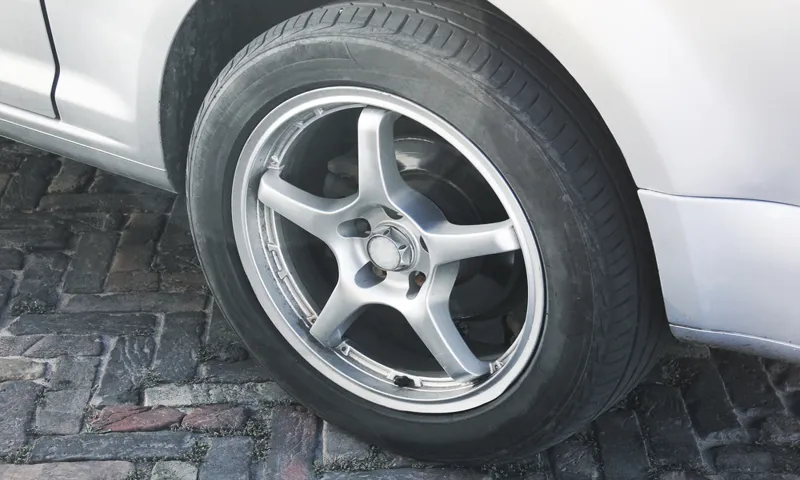Have you ever seen a tire come off a moving vehicle and wondered how it could happen? It’s a worrying sight, and it’s important to understand why it occurs to prevent it from happening to you. The truth is, tires don’t just fall off while driving for no reason; there are usually underlying causes. Tire failure is a major concern for drivers, and understanding why it happens is crucial for staying safe on the road.
In this blog, we’ll explore some of the common reasons why tires fall off while driving and provide some tips to help you avoid this dangerous situation. So, buckle up and let’s dive in!
Table of Contents
Introduction
Have you ever experienced a tire falling off while driving, or heard about it happening to someone you know? It’s a scary and dangerous situation that can cause serious accidents and injuries. But what causes this to happen? One of the most common reasons is loose or worn-out lug nuts. These nuts hold the tire in place on the wheel hub, but if they’re not tightened enough or are damaged, the tire can gradually loosen and eventually fall off.
Another possibility is a damaged or worn-out wheel bearing, which can cause the wheel to wobble and the tire to eventually detach. Poor maintenance and neglecting to check your tires regularly can also lead to this frightening situation. So make sure to keep your lug nuts tight, check your wheel bearings, and stay on top of tire maintenance to avoid this potential disaster on the road.
Definition of a Tire Fall Off
A tire fall off is a hazardous situation that can occur when a tire suddenly detaches from a vehicle while it is in motion, causing the driver to lose control. This is a dangerous and potentially life-threatening situation, and it is important to understand the causes of tire fall off to prevent them from happening. The most common cause of tire fall off is improper installation of the tire, which can cause the lug nuts or bolts to come loose and the tire to detach.
Other causes of tire fall off include worn or damaged parts, overloading the vehicle beyond its weight capacity, and driving on rough terrain. To avoid the risks associated with tire fall off, it is important to have your vehicle’s tires inspected regularly and installed by a qualified mechanic. Additionally, follow the manufacturer’s guidelines for proper tire maintenance and weight limits to ensure your safety while driving.

Causes of Tire Falls Offs
Tire falls offs can be really scary and dangerous, and it’s important to understand what causes them so you can prevent them in the future. One of the main causes is improper installation of the tire, which can cause the lug nuts to become loose and eventually fall off while driving. Another common cause is worn suspension components, such as ball joints or tie rod ends, which can cause the wheel to become loose and detach from the vehicle while driving.
Overloading the vehicle or carrying excess weight can also cause tire falls off, as the weight puts additional stress on the tires and suspension. Finally, worn or damaged tires can also lead to tire falls off, especially if they are not properly inflated or properly maintained. It’s important to regularly inspect your tires and suspension components to prevent these dangerous situations from occurring.
Worn or Damaged Lug Nuts
Have you ever experienced a tire falling off while driving? This can be a terrifying experience and is often caused by worn or damaged lug nuts. Lug nuts are responsible for keeping your wheels securely attached to your vehicle’s axles. Over time, these nuts can become worn or damaged, which can lead to them loosening or breaking off completely.
This can cause the wheel to detach from the vehicle, which is dangerous for both the driver and other road users. The key to preventing this issue is to regularly inspect your lug nuts for signs of wear or damage. If you notice any problems, it is important to replace them immediately to avoid the risk of a tire falling off while driving.
Don’t take any chances with your safety – stay vigilant and keep your vehicle in top condition to avoid accidents.
Loose Wheel Bearings
Loose Wheel Bearings One of the most hazardous events that can occur while driving is a tire falling off. This can happen for several reasons, and one of the main causes is loose wheel bearings. Wheel bearings are essential components in your vehicle’s wheels, as they help your wheels spin smoothly and reduce friction.
However, if they become worn out or damaged, they can cause your wheels to become loose, wobble, and eventually fall off. Loose wheel bearings can happen due to a variety of reasons, including poor maintenance, inadequate lubrication, or excessive wear and tear. It’s important to inspect your wheel bearings regularly, especially if you drive on rough roads or carry heavy loads.
Signs of loose wheel bearings include a grinding or humming noise coming from your wheels, uneven tire wear, and excessive vibration while driving. If you suspect your wheel bearings are loose, it’s critical to get them checked right away by a certified mechanic. Ignoring the issue can lead to disastrous consequences, including a tire falling off while driving, which can cause accidents, injuries, or even fatalities.
Don’t take chances with your safety or the safety of others on the road – make sure to keep your wheel bearings in good condition and have them replaced when necessary.
Poor Tire Maintenance
Poor tire maintenance is one of the leading causes of tire falls offs. Ignoring regular tire checks and rotations, as well as neglecting to fill tires with the correct pressure, significantly increases the chances of a tire falling off while driving. It is important to inspect your tires regularly and ensure they are properly inflated, aligned, and balanced.
Overloading your vehicle and frequently driving on rough roads can also cause excessive wear and tear on your tires, leading to potential failures. Failure to maintain your tires can not only lead to a dangerous situation, but it can also shorten the life of your tires and result in costly replacements. Remember, taking care of your tires is crucial for your safety and the longevity of your vehicle.
Overloading/Overinflated Tires
Overinflated or overloaded tires can easily lead to tire falls offs, which can be extremely dangerous for the driver and other vehicles on the road. Overloading your vehicle with too much weight can cause the tires to carry more weight than they were intended to, resulting in excessive stress and damage to the tires. This increases the risk of a blowout while driving, which can cause loss of control and lead to a catastrophic accident.
Similarly, overinflating the tires beyond their recommended pressure can cause the tires to wear unevenly, reducing their overall lifespan, and increasing the likelihood of a blowout. To prevent tire falls offs, it’s essential to always keep the tires properly inflated to the recommended pressure and refrain from overloading the vehicle. Regular tire maintenance, including checking for punctures and replacing worn-out tires, is also crucial to ensure that the tires are always in good condition to support your vehicle’s weight and ensure your safety on the road.
Road Hazards and Potholes
Road hazards, tire falls offs Driving on roads with potholes and other road hazards is not only frustrating but also dangerous. One prevalent issue drivers face is tire falls offs, where tires literally fall off the vehicle while in motion. This can result in serious accidents, injury, and loss of life.
Several factors can cause tire fall offs, including potholes, rough roads, worn-out suspension systems, and improper wheel installation. Potholes are one of the main culprits because they can cause severe damage to the tire and the rim, leading to premature failure of the wheels. Additionally, rough roads can cause excessive vibration that can loosen the wheel nuts, leading to tire detachment.
Worn-out suspension systems can also contribute to tire falls offs as they cannot absorb the impacts of these hazards effectively. Lastly, improper wheel installation, including incorrect torque values, is another critical factor that can cause tire detachment. To avoid these issues, drivers should maintain proper tire pressure, practice safe driving habits, and regularly inspect their vehicle’s suspension and wheels.
Preventing Tire Falls Offs
Tire falls off while driving can be a dangerous situation that could lead to accidents, injuries, and even death. There are different reasons why a tire falls off while driving, and the most common one is the lack of proper maintenance. A tire with worn-out treads, low pressure, or damage is more likely to fall off while driving.
Drivers should always ensure that their tires are properly inflated, rotated, and aligned to avoid this problem. Another cause of tire falls off while driving is loose lug nuts. Loose lug nuts can cause the wheel to wobble and eventually fall off while driving.
Drivers should ensure that their lug nuts are tightened to the manufacturer’s specification. Additionally, using the wrong size of lug nuts or wheels can also cause tire falls off while driving. It’s important to use the correct size of wheels and lug nuts that match the car’s specification to prevent accidents.
In summary, drivers must ensure proper tire maintenance, use the correct size of wheels and lug nuts, and tighten the lug nuts to the manufacturer’s specification to prevent tire falls off while driving.
Regular Tire Inspections
Regular tire inspections can prevent tire falls offs and ensure the safety of drivers and passengers on the road. By taking the time to inspect your tires, you can detect and address any issues before they lead to a dangerous situation. First and foremost, check the tire pressure regularly to ensure that it’s at the recommended level.
Low tire pressure can cause the tire to wear unevenly and ultimately lead to a blowout. Additionally, make sure that your tires have adequate tread depth, as a lack of tread can reduce traction and lead to hydroplaning in wet driving conditions. Finally, keep an eye out for any visible damage or cracks in the tire, which can be a sign of impending tire failure.
Making tire inspections a regular part of your routine can help prevent tire falls offs, ensuring that you arrive at your destination safely.
Proper Tire Maintenance
Tire falls off can be a scary and dangerous experience, but fortunately, it’s preventable with proper tire maintenance. One of the leading causes of tire falls off is underinflation, which can put undue stress on the tires and lead to premature wear and tear. It’s important to check your tire pressure regularly and inflate them to the recommended levels.
Another crucial aspect of tire maintenance is tire rotation, which involves moving the tires from one position to another to promote even wear. Neglecting tire rotation can lead to uneven wear, which can destabilize the tire and increase the risk of falls off. It’s also important to keep an eye on the tread depth, as worn-out tires can compromise traction and grip, especially on wet or slippery roads.
By taking these simple maintenance steps, you can ensure that your tires perform reliably and keep you safe on the road.
Correct Tire Inflation
Preventing tire falls offs is crucial for safe driving, and one of the easiest ways to do this is by ensuring correct tire inflation. Under-inflated tires are one of the leading causes of tire blowouts and sudden tire falls offs. Moreover, it can also cause excessive wear and tear on the tires, making them more susceptible to punctures and damage.
On the other hand, overinflated tires can lead to reduced tire grip and poor handling on the road. Therefore, it is always recommended to follow the tire manufacturer’s recommended tire pressure and ensure that the tire pressure is checked regularly using a tire pressure gauge. Maintaining the correct tire pressure not only helps prevent tire falls offs but also improves fuel efficiency and prolongs the lifespan of the tires.
Keeping your tires inflated properly is a simple and effective step towards safe and secure driving.
Avoiding Overloading
Overloading a vehicle can lead to dangerous consequences, especially when it comes to tires. One of the major problems that can arise from overloading is tire falls off, which can cause accidents and potential injuries. To prevent tire falls off, it is essential to ensure that your vehicle’s tires are in good condition and adequately inflated before loading the vehicle.
It’s also critical to check for any cracks or other indications of wear and replace any worn tires before driving. Properly distributing the load within the vehicle can also help prevent overloading, and it’s crucial to follow the manufacturer’s instructions on maximum load capacity. Remember, tires are essential for maintaining vehicle stability and keeping you safe while driving.
Keep your vehicle properly maintained and take steps to ensure you’re not overloading it to prevent tire falls off.
Conclusion
In conclusion, a tire falling off while driving is a case of a mechanical separation anxiety. Just like how we all have different preferences when it comes to our cars, each tire has its unique way of saying goodbye. From wear and tear, improper installation, to hitting a pothole, it seems that a tire can choose to break up with the car at any given moment.
So, when you feel your car shake or hear some unusual noises, just remember that your tire might be going through a tough breakup and it’s time to give it some much-needed attention.”
FAQs
What are some common reasons for a tire to fall off while driving?
Some common reasons for a tire to fall off while driving include loose lug nuts, worn out wheel bearings, and damaged suspension components.
Can overinflating or underinflating a tire cause it to fall off while driving?
While overinflating or underinflating a tire can cause it to wear unevenly and potentially fail, it is not typically a direct cause of a tire falling off while driving.
How can regular tire maintenance help prevent a tire from falling off while driving?
Regular tire maintenance, such as checking and tightening lug nuts, inspecting suspension components, and monitoring tire pressure and wear, can help identify and prevent potential causes for a tire falling off while driving.
What should I do if I notice my tire is loose or wobbling while driving?
If you notice your tire is loose or wobbling while driving, immediately pull over to a safe location and address the issue. This could include tightening lug nuts, checking wheel bearings, or seeking professional assistance.
Can driving on rough or uneven terrain increase the risk of a tire falling off?
Yes, driving on rough or uneven terrain can cause excessive stress on suspension components and increase the risk of a tire falling off. It is important to drive cautiously and inspect your vehicle after driving in these conditions.
How can I tell if my wheel bearings are worn and could cause a tire to fall off while driving?
Signs of worn wheel bearings can include a grinding or humming noise, vibration in the steering wheel or vehicle, and uneven tire wear. If you suspect your wheel bearings are worn, have them inspected and replaced as necessary.
Is it safe to drive on a tire that is visibly damaged or low on air pressure?
No, driving on a tire that is visibly damaged or low on air pressure can increase the risk of a tire failure and potentially cause a tire to fall off while driving. It is important to address any tire damage or low pressure immediately.



